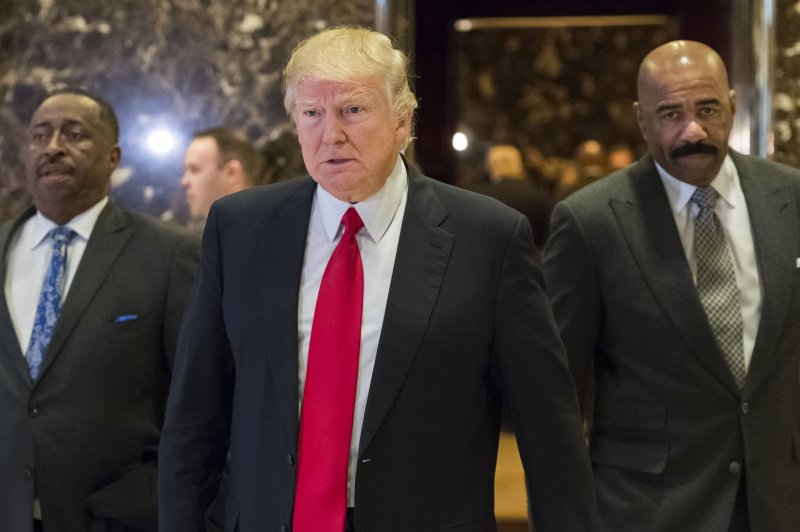President-elect Donald Trump (L) and media host Steve Harvey (R) make a few comments in the lobby of Trump Tower in New York on January 13, 2017. A memo to the State Department written by Trump's transition team includes pointed questions regarding U.S. engagement in conflicts in several African countries. Pool Photo by Albin Lohr-Jones/UPI |
License Photo
WASHINGTON, Jan. 14 (UPI) -- A memo to the State Department from President-elect Donald Trump's transition team asks a series of questions critical of U.S. policy in Africa.
The memo, obtained by The New York Times, includes a long list of questions about U.S. involvement in conflicts in several African countries. Questions varied from how U.S. business interests are being advanced in Africa, to whether it was wise to continue giving aid to countries with potentially corrupt leaders. It also asks about the need for some humanitarian missions, like whether U.S. money spent fighting AIDS and tuberculosis in Africa is becoming "a massive, international entitlement program."
Africa experts who read the memo told the Times the tone of many of the questions implies deep skepticism about U.S. engagement in Africa.
Beyond humanitarian and business questions, the Trump memo also asks about potential terrorist concerns, including whether fighting Islamic extremists in Somalia and elsewhere is necessary, given that the threat from those groups is generally a regional concern, not an international one.
Specifically, the memo asks why the United States is bothering to fight the Boko Haram insurgency in Nigeria, why the schoolgirls kidnapped by that group have not been rescued and why, after years of supporting efforts to defeat Somali terrorist group al-Shabaab, the goal has not been accomplished.
"We've been fighting al-Shabaab for a decade, why haven't we won?" the memo asks bluntly.
The memo represents the first substantive words from Trump on U.S.-Africa policy since the beginning of the presidential campaign. While Trump has expressed skepticism about foreign aid in general and suggested the United States must realign its diplomatic posture to benefit itself first, he did not speak about Africa specifically during the campaign.
Polls show Americans share Trump's skepticism about U.S. foreign aid, albeit with a misperception about how much the federal government actually spends on it. When asked, Americans tend to vastly overestimate the amount of money the U.S. government gives away to other countries. On average, Americans estimate 25 percent of the federal budget is given to other countries. In reality, foreign aid is about 1 percent of the budget.
U.S. aid to all of sub-Saharan Africa totals about $8 billion per year, spread over dozens of countries. George W. Bush made aid to Africa a priority, increasing the amount of money spent there by about four times. The Obama administration largely left that funding in tact, despite cuts in aid to other parts of the world. Whether Trump will do the same remains an open question.
As for African leaders themselves, at least one said he believes the continent will not rank highly on Trump's radar after taking office.
Djibouti President Ismail Omar Gulleh told Voice of America that the general consensus among leaders in sub-Saharan Africa is that U.S. interest in African affairs will wane, along with the amount of active engagement on a wide array of issues.
Djibouti, a small nation on Africa's eastern coast, next to Ethiopia, is one of the United States' closest allies on the continent. It hosts the lone U.S. military base in Africa, which has served as a launching point for military strikes against terrorists in neighboring Somalia.
Gulleh said African nations might not rank on Trump's personal agenda, but existing relationships with U.S. institutions will continue largely uninterrupted.
"Africa does not appear on the foreign agenda of the U.S. president-elect, Donald Trump, but as Djibouti, we had a good and deep relationship with U.S. government which I am hopeful will continue," Gulleh said. "Our relationship was not with an individual but with U.S. institutions."















